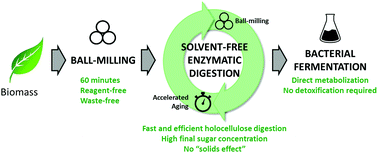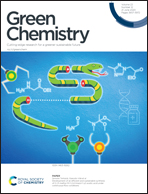Rapid mechanoenzymatic saccharification of lignocellulosic biomass without bulk water or chemical pre-treatment†
Abstract
Lignocellulosic material is an abundant renewable resource with the potential to replace petroleum as a feedstock for the production of fuels and chemicals. The large scale deployment of biomass saccharification is, however, hampered by the necessity to use aggressive reagents and conditions, formation of side-products, and the difficulty to reach elevated monosaccharide concentrations in the crude product. Herein we report the high efficacy of Reactive Aging (or Raging, a technique where enzymatic reaction mixtures, without any bulk aqueous or organic solvent, are treated to multiple cycles of milling and aging) for gram-scale saccharification of raw lignocellulosic biomass samples from different agricultural sources (corn stover, wheat straw, and sugarcane bagasse). The solvent-free enzymatic conversion of lignocellulosic biomass was found to proceed in excellent yields (ca. 90%) at protein loadings as low as 2% w/w, without the need for any prior chemical pre-treatment or high temperatures, to produce highly concentrated (molar) monosaccharides. This crude product of mechanoenzymatic depolymerization is non-toxic to bacteria and can be used as a carbon source for bacterial growth.



 Please wait while we load your content...
Please wait while we load your content...